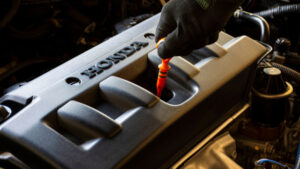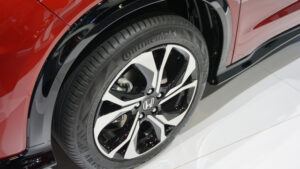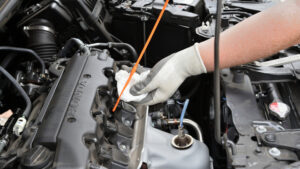What is The Best Year for a Honda CR-V?
Covered in This Article:
It’s been said that CR-V stands for “Comfortable Runabout Vehicle” or “Compact Recreational Vehicle”…and BOTH adequately describe this compact crossover SUV manufactured by Japanese automaker, Honda. It is also known as both a SUV (sports utility vehicle) and CUV (cross over utility vehicle).
Unveiled to the American auto market at the 1996 Chicago Auto Show, the Honda CR-V is now in its fifth generation. It faces stiff competition by vehicles like the Toyota RAV4 and the popular Ford Escape.
If you are considering buying a used car that has under 140,000 miles and is a 2012 model or newer, get a free quote for one of our "extended car warranty solutions".
100% Online, 9 Coverage Options and No Robocalls!
How Reliable is a Honda CR-V?
Rated as #2 out of a field of 26 compact SUVs, the Honda CR-V scores a 4.5 out of a possible 5.. Not only is it reliable – it is also economical to own.
What Are Common Honda CR-V problems?
Although reliability ratings are high, the 2015 Honda CR-V is one model year that has been plagued with problems. Owners complained of the vehicle shaking violently while in idle. A service bulletin was issued by Honda suggesting replacement of the powertrain control module or transmission mounts; but although some owners got relief from these measures, many are still frustrated with the problem.
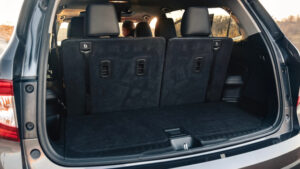
If all that isn’t bad enough, the 2011 Honda CR-V has also been written up for unwanted acceleration issues. The estimated cost to fix this problem exceeds $5000 and the issue occurs at an average of only 16,000 miles driven!
Honda CR-V Problems by the Year
The first generation CR-V was given only a marginal safety score by the IIHS (Insurance Institute for Highway Safety). The low score was due to a “lack of cushioning” leading to driver’s knees being injured in a crash. There was also a reported “increased chance of rollover.” Additionally, the first generation CR-V had sway bar issues, and oil reportedly leaked around the valve and timing chain covers. These issues could cause an engine to “blow.” Timing belt teeth were also prone to wearing down. Differential fluids broke down causing the rear differential to stop working correctly. Exhaust valves would burn up if not adjusted every 30,000 miles. And, rust was a common problem, as well.
Second generation Honda CR-Vs were launched in 2002. This generation gave birth to a new 2.4L engine. Due to new safety features, high repair costs were reported in even minor collisions. The rear differential was still a problem and needed to be regularly maintained. Oxygen sensors were reported to fail, as well as u-joints and motor mounts.
The most common problem for CR-V models from 2002 – 2006 was ominously called “The Black Death.” This is when the air conditioning compressor failed and contaminated the whole system, which lead to high repair costs.
The model years with the most complaints are 2007 and 2011. The NHTSA claims most reports were for tires wearing unevenly, excessive road noise, limited visibility and blind spots, door lock problems and failing air conditioner compressors.
The 2010 and 2011 Honda CR-V has had complaints of high oil consumption caused by piston rings. Honda did extend the warranty on those parts to cover 8 year / 125,000 miles.
2010 also saw a recall for airbag problems, electric system issues and faulty transmission control modules.
The third generation Honda CR-V was considered by some to be the worst generation. Sharing the DNA of generations before, there were still rear differential and faulty AC compressor issues, but leaking steering fluid and airbags that did not inflate properly added to the list. The most expensive problem of this generation – model years 2007-2011 – was unwanted acceleration issues. When the driver pushed the brake, the engine revved up.
Generation four covered model years 2012 through 2016. This generation received the most overall complaints by CarComplaints. The 2015 model lead the way with reports of violent shaking during idle conditions. Other issues were uncomfortable seating and reports of rodents eating the soy wiring. Also reported were heater issues.
The fifth generation CR-V reported less problems than other generations. Although not problem-free, owners of Honda CR-V model years from 2017 to present still complain about earth-friendly soy wire covering being chewed by pesky rodents, and the radar-guided adaptive cruise control gets “confused.” The most costly problem was that fuel vapors seeped into the turbo engine.
2017 CR-V models also had problems with the fuel injection system. Drivers reported a gas odor inside the car while driving. The same model year has seen problems with the heating system.
Know Your HONDA CR-V
Below is a little crash course on various reported Honda CR-V problems, what the terms mean and other info you may need to know:
Honda CR-V Starter Problems
The most common reason for starting issues in the Honda CR-V is a weak battery, although other causes could be a faulty alternator or a failed starter.
Honda CR-V Intermittent Starting Problem
Dead key fobs, corrosion on the battery terminals, clogged fuel filter, empty gas tank, immobilizer errors and any faults in the electrical system could cause starting issues.
Honda CR-V Power Tailgate Problems
This issue was usually caused by a damaged tailgate motor. A defective sensor could also lead to the tailgate not opening or closing when the button is pushed.
 Honda CR-V AC Problems and Air Compressor Problems
Honda CR-V AC Problems and Air Compressor Problems
Honda customers who owned a CR-V in model years 2015 – 2019 may have had defective air conditioning systems. AC condensers cracked and refrigerant leaked out, causing the system to stop blowing cold air. When the refrigerant leaked, it may have damaged other expensive components within the vehicle.
Honda CR-V Shutter Grille Problem
The CR-Vs upper and lower grille shutters should work together; opening and closing to reduce air flow for the purpose of reducing aerodynamic drag and to increase fuel efficiency. Located at the front bumper lower opening, if they are not communicating, the PCM (power train control module – a combination of the engine control unit and the transmission control unit) will go into a reduced power mode.
Honda CR-V Oxygen Sensor Problem
When this sensor fails, drivers notice decreased fuel efficiency, misfires, rough idling and stalling. A faulty sensor could also cause a vehicle to fail required emissions testing.
Honda CR-V Catalytic Converter Problems
Catalytic converters generally don’t fail unless something else is compromised. But they too can wear out over time. If your CR-V is experiencing problems with the catalytic converter you may hear a rattling in the engine. You could notice odd exhaust smells, hear misfires, or experience loss of engine power and acceleration “jerks”. You may also notice decreased gas mileage and see black smoke. Your check engine light should be on.
The cost to replace a Honda CR-V catalytic converter is around $1850. The EPA’s Federal Emissions Warranty says catalytic converters must be covered for eight years or 80,000 miles.
Honda CR-V Heater Problems
There could be many reasons that your Honda CR-V is experiencing heater issues. It could be as easy as a broken thermostat or low coolant levels. It could also be a more extensive heater core problem.
Blind Spot Info System Problem Honda CR-V
If you get a dashboard warning that there is a “blind spot info system problem” it is usually due to a failed sensor.
Collision Mitigation System Problem Honda CR-V
The CR-V driver assistance technology has had problems that have lead to law suits. This technology is designed to assist in four areas; collision avoidance, lane assistance, road department mitigation and adaptive cruise control – where a radar system keeps you at a constant distance from the car in front of you. In an instance where the CR-V collision mitigation system thinks there is an obstacle ahead that may cause a collision, it will attempt to brake to avoid the crash. When it’s a false positive, it brakes for no apparent reason. You can turn off this feature by pressing the CMBS OFF switch on your CR-V dashboard for approximately 1 second.
Honda CR-V Bluetooth Issues
When you can’t connect your phone and/or your Bluetooth isn’t working in your Honda CR-V, try removing the Bluetooth entry from both your car and your phone. Reboot your mobile phone and turn off the car’s ignition. Then turn your CR-V back on and try pairing them together again.
Honda CR-V Engine Problems
If you are haunted by the “check engine light” of your Honda CR-V, you’re not alone. CR-V owners have reported spending time to get this repaired, only to have it shining back at them a week (or less!) later.
Here’s a few thing to tell your mechanic about should you experience the dreaded “check engine” warning:
Take special note if you smell gasoline while driving.
Can you also smell it outside the car?
Is your car stalling?
Are you losing power?
Do you experience delayed acceleration?
Does your CR-V battery need to be charged often?
There could be a lot of reasons for a check engine light to come on…be sure to notice what was happening at the time it does.
Honda CR-V Engine Replacement Cost
A remanufactured CR-V engine will set you back around $2500. New CR-V engines are at least $4000.
Honda CR-V Brake System Problem
If your battery is low on charge and you attempt to start your engine, you may witness all kinds of weird warning lights going off and on…one may be the brake system warning light. Make sure your battery is functioning correctly before you seek service for the brake system.
Electric Parking Brake Problem Honda CR-V
If your car won’t start and has the “brake system problem” indicator light on, it’s could be due to an issue with the electronic parking brake. These have a tendency of getting stuck “on” and the main reason for that is that your battery is not charging properly. Make sure the battery terminals are clean and that your battery is properly charged.
Do Honda CR-Vs Have Transmission Problems
Honda issued technical service bulletins (TSB) on multiple CR-V model years that have problems with shifting in their manual transmissions models. But as a Honda CR-V owner, you should know that the most common cause of shifting difficulty in transmissions is low transmission fluid. The transmissions fluid is there to keep your car parts lubricated. If the parts are not properly lubricated, extreme friction may occur. Where there is friction – there is heat – and damage. Warning signs that your transmission is in trouble include: burning smells, slipping gears, leaking fluid, grinding and/or shaking, struggles to shift gears, and engine noise. Honda CR-V manual transmission issues were particularly prevalent in 1997, 1998, 1999 and 2000 models.
Honda CR-V Automatic Transmission Issues
Reports of “harsh shifting” and acceleration issues have been addressed in TSBs, as well. Noise and vibration are also reported. There was a recall of 237,000 CR-V models between 2002 and 2003. The shift cable linkage tends to corrode and this prohibits drivers from being able to shift into park. As we talked about previously, Honda CR-Vs are reliable. Transmission issues have not been a common nor reoccurring issue.
Honda CR-V Transmission Replacement Cost
Replacement costs on a new Honda CR-V transmission could run over $3,500. It’s worth the price to have regular transmission maintenance services performed – such as fluid changes and transmission flushing. Honda-issued maintenance schedules suggests you change transmission fluid in your CR-V every 90,000. Check your owner’s manual to find out more.
Honda CR-V Electric Window Problems
ConsumerReports.org says that Honda recalled 268,000, 2002-2006 CR-Vs when moisture caused the power window switch to fail. It was noted that this failure was commonly caused by rain through an open window or liquids that were spilled on the driver’s side door.
Honda CR-V ABS Problems
Between the model years 2002-2008, it was quite common for the Honda CR-V ABS (anti locking brake system) pump module to fail. This caused the VSA/ABS light to come on.
Honda CR-V Head Gasket Problems
If you notice white smoke coming from your tailpipe, a bubbling noise in your radiator, coolant loss with no signs of leaks, a milky color in the engine oil and /or experience engine overheating – you probably have a bad head gasket.
Head gaskets are cheap – it’s the labor to have them installed that is expensive.
Plan on at least a $1200 repair bill.
To avoid breaking the bank, replace your coolant every 60,000 miles. Replace your air filter every 15,000 to 30,000 miles. Spark plugs may need changed every 100,000 miles (copper plugs need changed at 30,000 miles). Make sure your CR-V’s cooling system is working well. If your engine is running smoothly the head gasket should last as long as the engine. – on a Honda CR-V that means 200,000+ miles or more than 10 years!
Honda CR-V Ignition Problems
Battery and alternator problems are the most common reasons that a CR-V will not start. It could also be a faulty starter.
Honda CR-V Strut Problems
CR-Vs from 1996 were famous for suspension problems. Most complaints were with the front suspension and the front suspension control arm.
Honda CR-V Door Lock Problems
Faulty door lock actuators were reported in Honda CR-V models from 2007-2011 . To add insult to injury, owners reported that the same part failed repeatedly. Lawsuits were filed and Honda eventually extended the warranty on the faulty part.
Honda CR-V Oil Problems
This problem occurred in CR-V model years 2017 and 2018 equipped with the 1.5 liter turbocharged engine.
Emissions System Problems Honda CR-V 2018
If you have a 2018 Honda CR-V and your emissions system light is illuminated, it may be the air mass flow sensor.
Honda CR-V Compass Calibration Problems
We’ll assume you already checked your owner’s manual for this one. If that’s not working, check out online chat groups like the CR-V owners club.
https://www.crvownersclub.com/threads/compass-flashing.127593/
Honda CR-V Fuel System Issues
Honda recently recalled vehicle because of a fuel system malfunction. The 2018-2019 CR-V were included in that recall. The recall addressed a fuel pump issue that could cause the engine to stall while in motion. You can call the National Highway Traffic Safety Administration’s Safety Hotline at 1-888-327-4236 to find out if your vehicle was affected. You will need your VIN number. Honda will replace the fuel pump assembly, if your car was included.
Honda CR-V Motor Mount
The average cost of a engine mount replacement for the CR-V is around $600.
Cabin vibration while driving can be an indication of this component failure.
Honda CR-V Sudden Acceleration
The 2011 CR-V has been reported to accelerate even when pressing on the brake, resulting in accidents…and legal problems for Honda.
Honda CR-V Adaptive Cruise Control Problem
Owner’s can modify their “sensing” to calibrate for their specific driving preferences. You’ll find a “how to” online at www.majorworld.com/can-you-turn-honda-sensing-off/
Honda CR-V Alternator Problems
Not a problem to be ignored; if the alternator warning light comes on while you are driving, you’ll soon begin to lose power. You car’s lights will dim and you will eventually stall. Your car won’t be able to accept a “jump” to get it restarted. Cost of replacement could be between $600 and $1100.
What Are The Average Maintenance Costs for Honda CR-V?
Hondas are reliable and generally cost less to maintain than other vehicles. The Honda CR-V is substantially cheaper to maintain than others in its class. The CR-V has an average maintenance cost of $428 annually, as reported by RepairPal.com.
How Much is a Honda CR-V?
The 2021 Honda CR-V starts at a cost of $25,350 for the base LX model. Front wheel drive is standard, but all-wheel-drive is an option that will cost you about $1500 extra.
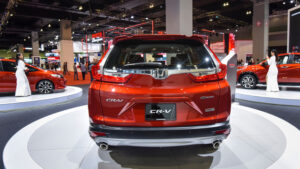
The cost for a fully loaded CR-V can exceed $40,000.
How Much is a Honda CR-V Hybrid?
Starting at $30,960- the 2022 Honda CR-V Hybrid was given a 4/5 by Kelley Blue Book and a 9/10 by Car and Driver. It gets an impressive 40mpg city and 35 mpg highway. The EX model starts at $30,960. The EX-L has an MSRP of $33,550. The Touring trim package offers satellite navigation, a wireless smartphone charger, automatic rain-sensing wipers and nine-speaker sound system. It has a starting cost of $36,750.
What is The Best Year for a Honda CR-V?
It may come as some surprise that some of the older models of the Honda CR-V are as reliable than the newer ones. The 2005 and 2006 model year CR-V offers good fuel economy, a smooth ride, reliable engine and comfortable ride.
If you’re not into driving a car that old, check out the 2015 and 2016 CR-V models. The CVT (Continuously Variable Transmission) helps to get the all-wheel-drive an average MPG of 26 in the city. And, the reports are decent when talking about reliability, handling and interior space.
Summary
The Honda CR-V is one of Honda’s best-selling cars. It’s also one of the best-selling SUVs in the entire United States. The CR-V handles well, is affordable to drive and has a reputation for being extremely safe. Consumer Reports gives the Honda CR-V 4 out of a possible 5 points for customer satisfaction.

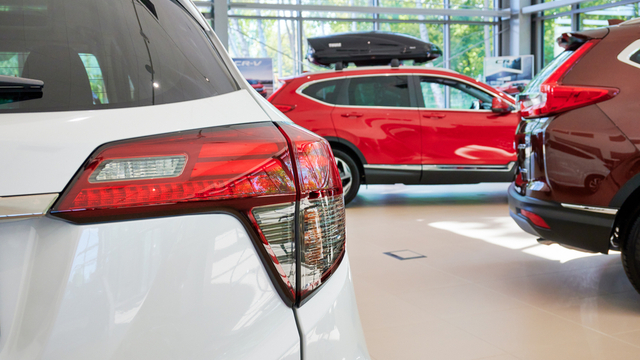
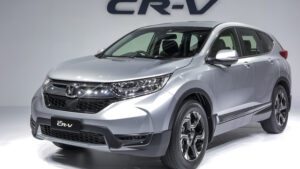
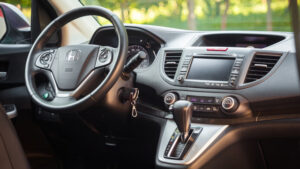
 Honda CR-V AC Problems and Air Compressor Problems
Honda CR-V AC Problems and Air Compressor Problems